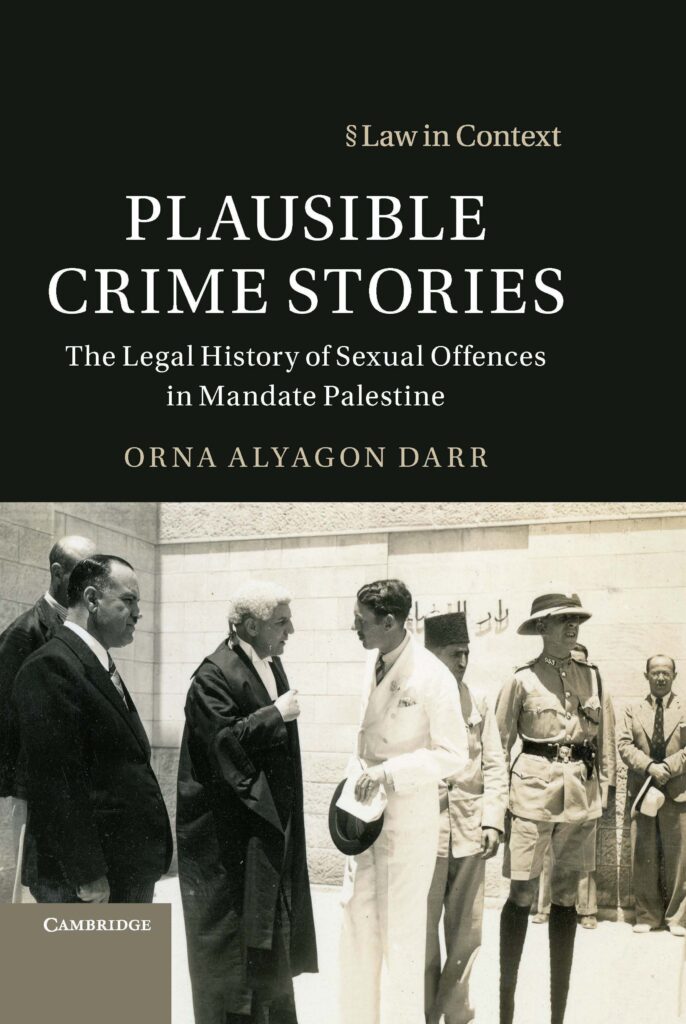Orna Alyagon Darr
Plausible Crime Stories: The Legal History of Sexual Offences in Mandate Palestine explores the history of sex offences in Mandate Palestine. It delves into this dark and difficult history by reviewing the proof in legal cases concerning rape, sexual assaults of children, sodomy and consensual sex between men, an act which was criminalized by the British, who ruled Palestine from 1918–1948. The book asks: What makes one story about sex offences convincing and another implausible?

NOTCHES: In a few sentences, what is your book about? Why will people want to read your book?
Orna Alyagon Darr: The book tells the stories of people not usually viewed as “important enough” to leave their marks in history books, people like: sixteen-year-old Abadalla, a male prostitute and keeper of a brothel in Acre; Nokha, a fourteen-year-old girl who was raped when she was grazing the family’s camels; Carlo, an Italian sergeant, who was called to testify about his passionate evening with eighteen-year-old Mohammad; or eight-year-old Nizar, who was sodomized by a young employee in the storage room of his father’s pharmacy. Through the stories of diverse social players, the book studies legal proceedings within their socio-cultural context and explores subjects like the criminalization of male sex, the testimonies of child victims, and the link between sex offences and ethnicity, and between law and emotions. The book tries to decipher why one story about a sex offence is found believable while another is not.
NOTCHES: What drew you to this topic?
Darr: What fascinated me was the question of proof. Sexual crimes are often perceived as crimes that are very difficult to prove, being typically committed outside the view of eyewitnesses. The assessment of the truthfulness and reliability of testimonies hinges, to a large extent, on shared cultural knowledge that is not explicated and is not part of the formal rules of evidence law. Since the population of Mandate Palestine was very diverse, and because of the colonial context, I expected to find varied perceptions regarding sex offences and the best way to prove them. The focus on plausibility opens a window onto a broad societal view of past mentalities, tensions, emotions and hierarchies. Its purview extends to legal proof, and sheds light on past self-identity, the essence of normality and deviance and notions of gender, morality, nationality, ethnicity, age, religion and other cultural institutions in the period studied.
NOTCHES: Did the British transplant into Palestine the English prohibition on male sex?
Darr: The criminalization of male sex was a novelty the British introduced in Palestine. During the days of the Ottoman Empire, consensual male sex was not prohibited. The British also introduced the distinction between forced male sex (‘sodomy’) and consensual male sex (‘unnatural offences’, also termed as offences ‘against the order of nature’). In England there was no similar distinction between forceful and consensual sexual acts or between those involving adult and minor partners. Not until 1994 was male rape explicitly acknowledged in English criminal legislation as a distinct offence. In Palestine, the British had addressed it almost sixty years earlier.
Interestingly, enforcement of the prohibition on consensual male sex seems to have been quite lax. Whereas in England sex between males was subjected to surveillance by various agencies, and was actively targeted in raids and crackdowns, in Palestine the authorities mainly responded to cases that were presented to them. In addition, while the British presented the criminalization of sex between men as a method to instill superior morals in the deprived ‘East’, the analysis of legislation and court cases reveals a significant intersection between colonial law and local culture.
NOTCHES: This book is about the history of sex and sexuality, but what other themes does it speak to?
Darr: Plausible Crime Stories pioneers a new approach for the study of the history of sexuality, but it may also appeal to those interested in the social history of Mandate Palestine from a unique angle, the history of crime, the history of childhood, the connection between law and emotions, and the cultural context of evidence law.
NOTCHES: How did you research the book? (What sources did you use and were there any especially exciting discoveries or any particular challenges?)
Darr: The book is based on archival materials, including 147 criminal court cases. These files contain not only the authoritarian voices of legislators, judges and experts, but also the voices of criminal defendants, victims and witnesses. The files usually contain three layers of information: the police investigation, the preliminary inquiry held by a Magistrate, and the trial at the District Court. Sometimes I was able to find an appeal to the Supreme Court. The material reflects the different perspectives of diverse social players: British, Arabs and Jews, villagers and city dwellers, adults and children, women and men, rulers and subjects, educated and illiterate, rich and poor etc. Their descriptions illuminate the daily lives and beliefs of Palestine’s inhabitants.
I made many exciting discoveries. One surprising finding was the ethnic patterns of complaints. While the Arabs hardly mentioned the subject in the Arab press, they were much more forthcoming than the Jews with complaints to the authorities. In contrast, the Hebrew press routinely covered sex offences, but the Jews only rarely filed a complaint to the police, and they were especially reluctant to complain of a fellow Jew. This cannot be explained by demography, and the book offers several explanations to this ethnic pattern. The files contained many surprising revelations. If I were to single out one moment, it was when I found a photo of sixteen-year-old Abdalla, a prostitute and brothel keeper, in the file against him – he was wearing a polka dot dress, had a feminine haircut and was looking at the camera with vulnerable eyes.
NOTCHES: Whose stories or what topics were left out of your book and why? What would you include had you been able to?
Darr: I discovered so many stories and I had to choose. I left out one case of bestiality. I did not want to make generalizations based on a single and quite extraordinary case. I wish I had more material about sex offences within the Jewish community. Since Jews were generally reluctant to complain, I had to trace alternative sources such as memoirs, literature or material about community tribunals or acts of revenge. The Tel Aviv District Court served a population that was mostly Jewish, but the criminal cases from there did not survive. Perhaps these files could shed some more light on sex offences within the Jewish community.
NOTCHES: Did the book shift significantly from the time you first conceptualized it?
Darr: I started by writing texts about subjects and cases that interested me, and it took me a while to figure out that there was a common thread. Once I conceptualized the book as an exploration of the plausibility of stories about sex offences, I decided that each chapter would address one aspect of plausibility in a distinct context. For example, the chapter about male-on-male offences analyzes the compatibility of the stories with an underlying cultural narrative; the chapter that inspects how the identity of the speaker affects plausibility concentrates on the child witness etc.
NOTCHES: How do you see your book being most effectively used in the classroom? What would you assign it with?
Darr: The book may be useful for advanced undergraduate and graduate students interested in the history of sexuality, legal history, law in its social context, theory of evidence law, Middle Eastern history and the history of the British Empire and colonialism. I would assign it with literature that explores the connection between law and its socio-cultural context. The concept of plausibility it develops makes it suitable to assign with literature on narratives and narrativity as well.
NOTCHES: Why does this history matter today?
Darr: This history matters because proof in cases of sex offences still largely depends on the interpretation of testimonies and their plausibility. Understanding the mechanisms that cause us to deem one story plausible and mistrust another can help in reaching conclusions that are not based on rape myths and prejudice.
NOTCHES: Your book is published, what next?
Darr: I am involved in several research projects. The one that may be of most interest to the readers of NOTCHES would be research conducted jointly with my colleague, Ruthy Lowenstein Lazar, about male rape. We investigate how rape myths influence the perception of male rape and its scope. This is a work in progress, and we’d love to share our findings at the conclusion of this research.
 Orna Alyagon Darr is an Assistant Professor at the Law School of Sapir College and Ono Academic College, Israel. Her research focuses on evidence law and criminal law and procedure in their historic, social and cultural context. She is the author of Marks of an Absolute Witch: Evidentiary Dilemmas in Early Modern England (Ashgate, 2011) and Plausible Crime Stories: The Legal History of Sexual Offences in Mandate Palestine (Cambridge University Press, 2019).
Orna Alyagon Darr is an Assistant Professor at the Law School of Sapir College and Ono Academic College, Israel. Her research focuses on evidence law and criminal law and procedure in their historic, social and cultural context. She is the author of Marks of an Absolute Witch: Evidentiary Dilemmas in Early Modern England (Ashgate, 2011) and Plausible Crime Stories: The Legal History of Sexual Offences in Mandate Palestine (Cambridge University Press, 2019).

NOTCHES: (re)marks on the history of sexuality is licensed under a Creative Commons Attribution-NonCommercial-NoDerivatives 4.0 International License.
Based on a work at www.notchesblog.com.
For permission to publish any NOTCHES post in whole or in part please contact the editors at NotchesBlog@gmail.com




